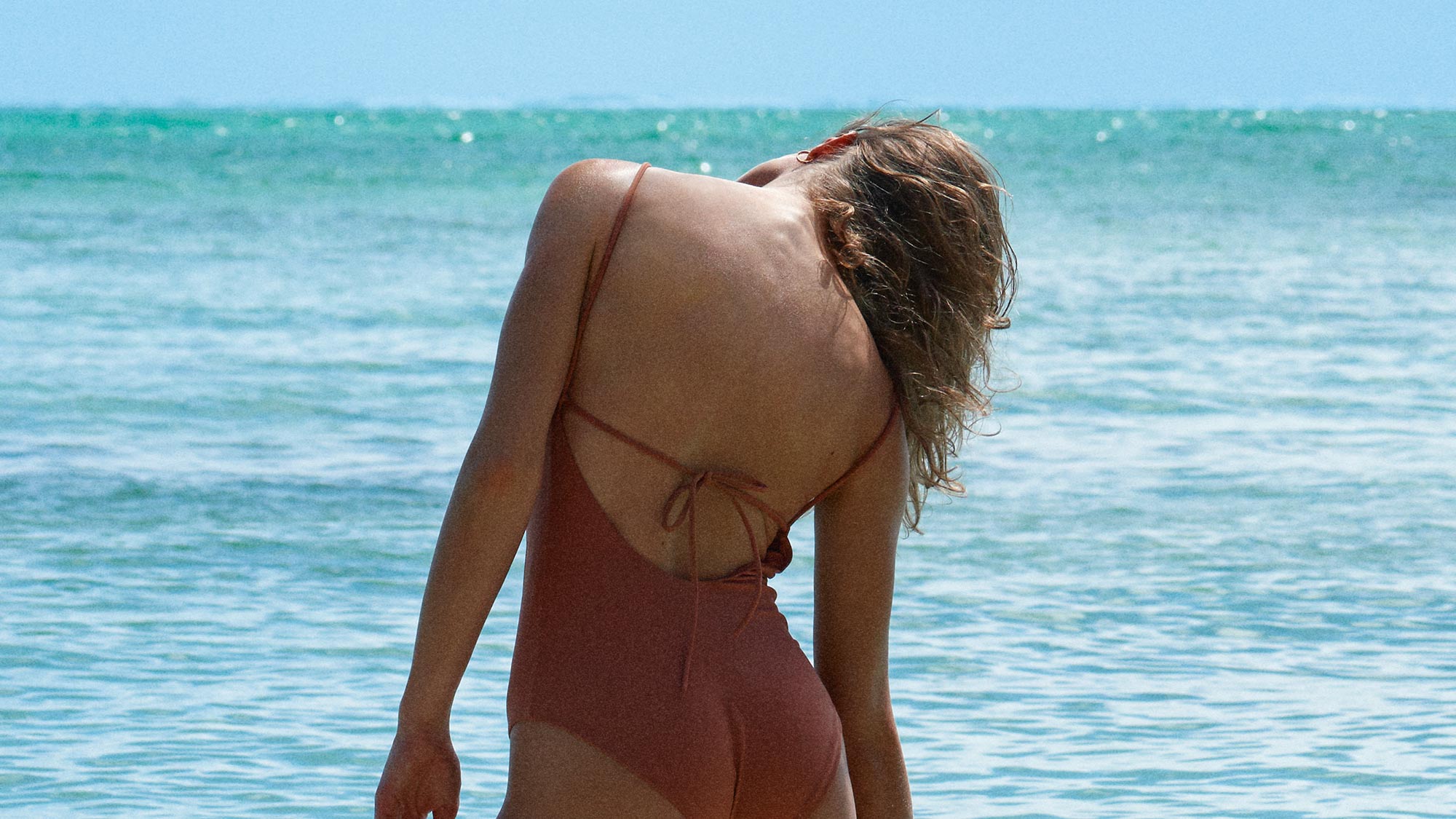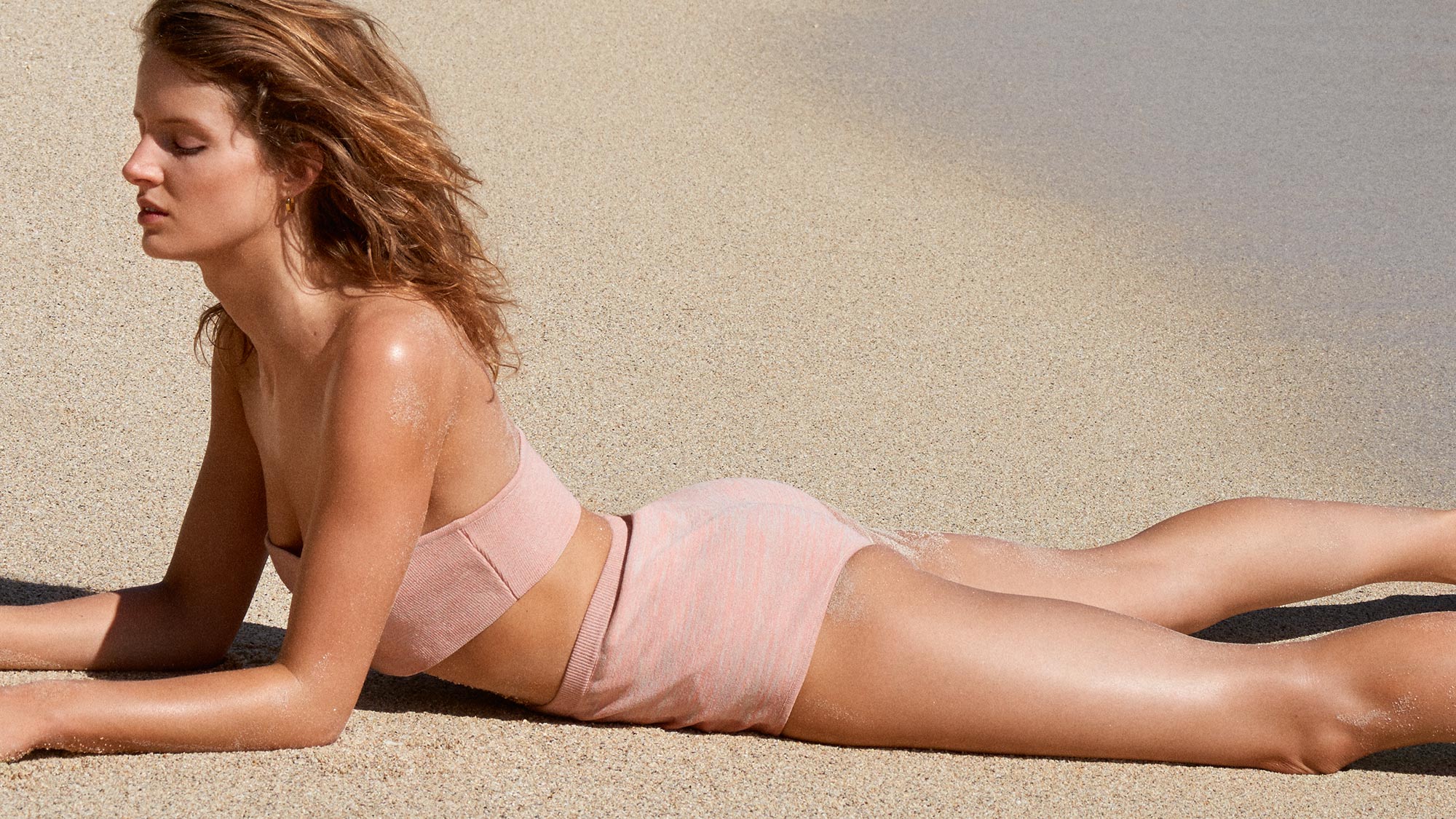Clouds won't protect your skin and nor will the shade. Meet the SPF rules you can't afford to dismiss
No more SPF excuses

No more SPF excuses
Words Suzanne Scott
Let’s cut straight to it, skin cancer is on the rise. At their last count, Cancer Research UK reported 15,419 new cases of melanoma skin cancer in one year, that’s a 119% increase since the early 90s.
Shocking, right?
But seeing as a quarter of us do not wear sunscreen, this stat starts to make more sense.
Maybe you won’t notice it next year, or the year after that, but sooner or later that weekend of sun excess will show up as wrinkles, pigmentation and rough texture – if you’re lucky. In fact, UV is responsible for 80% of premature skin ageing.
When it comes to excuses for not wearing sunscreen, I've heard them all (and I’m guilty of a few myself): ‘I didn’t know when to reapply’, ‘My skin is too sensitive for sun protection’, ‘Sun cream gives me spots.’ Quite frankly they all fall short. If you want healthy, beautiful, plump and even skin you have to wear sunscreen because no amount of laser or expensive facials can undo years of negligence. I should know; a few careless run-ins with the sun when I was younger has marred my shoulders with pigmentation that I will have to contend with for the rest of my life (not to mention my subsequent increased risk of melanoma) which is why you’ll never catch me out of the house sans SPF 30.
Celebrity news, beauty, fashion advice, and fascinating features, delivered straight to your inbox!
Just don't buy into the clickbait stories that appear in your social feeds extolling the virtues of SPF alternatives such as coconut oil (aka copra oil). It shouldn’t come as a shock that coconut oil is not an effective sunscreen, it offers such negligible protection that to call it sun protection is laughable.
So, to make your life easier I went direct to the experts and sought answers to every question you could possibly have about sunscreen. There are no more excuses! You can thank me later.
Should I wear SPF every day? Even when it’s cloudy?
‘Yes! UVA is present regardless of the weather and that’s what’s responsible for skin ageing (UVB is responsible for burning). Even on an overcast day, 80% of these dangerous rays penetrate through the clouds,’ says aesthetic doctor Dr. Maryam Zamani. ‘Use a daily moisturiser such as MZ Skin Hydrate and Nourish which has the addition of an SPF 30 to protect your skin from both UVA/UVB rays.’
If I put my SPF on in the morning am I covered for the whole day?
‘You need to top-up your sun protection throughout the day,’ advises cosmetic dermatologist Dr. Sam Bunting. ‘If you’re wearing makeup and you don’t want to take it off and start all over again try using a spray SPF or a powder that you can apply over the top. This is not as effective as a proper reapplication but sometimes it’s not practical to start from scratch.’

I always stick to the shade, do I still need an SPF?
‘Yes, you do. Sandy beaches, light concrete, and the sea reflect UV back onto your skin so wearing sunscreen is non-negotiable,’ says Dr. Lowe.
My makeup contains an SPF. Does this mean that I don’t need to use a separate SPF?
‘Relying on the SPF in your makeup doesn’t do the job because you don’t use enough of it and the SPF isn’t high enough. The key is to layer; apply your day cream with SPF and then layer your SPF makeup over the top,’ says Dr. Zamani.
How do I know what factor sunscreen I should wear?
‘Everyone should be wear a broad spectrum UVA and UVB sunscreen. A factor 15 means that if it takes you 10 minutes to burn without protection, it will give you 150 minutes of protection before burning. SPF15 filters 93% of UVB rays while SPF30 filters 97%. I recommend wearing an SPF 30 year-round and going up to a 50 during the summer or on holiday. But, you must reapply every two hours in order to keep your skin protected,’ advises Dr. Zamani.
Are there certain areas of the body that I should pay special attention to?
‘Hairlines, tips of ears and the sides of the neck often get missed. Take the time to do a full-body application indoors when you’re naked so you can ensure you don’t miss anywhere,’ suggests Dr. Bunting.
My skin is really dark, do I still need to where SPF every day?
‘Black skin – even very black skin – can burn, you may not see it but the damage is there,’ warns Dr. Lowe. ‘Your skin will also prematurely age from UV - it can become discoloured and turn a little grey – and while your chances of developing skin cancer are low it’s still a risk. I suggest wearing a daily SPF of 30 to keep your skin looking its best.’
I have been taking tanning supplements in the run-up to my holiday. Do I need to wear SPF?
‘Tanning supplements will not protect your skin from burning, nor will they protect against skin DNA damage or melanomas (skin cancers). To get the very best protection it is imperative that you apply sunscreen at regular intervals throughout the day,’ says Dr. Susan Mayou.
How can I tell if the sun protection in my product is any good?
‘When purchasing sunscreen in the UK you will notice a UVA star rating (from 0-5) on the bottle. It’s vital to choose a high SPF as well as a high UVA protection (the more stars the better). If you see a sunscreen labelled “broad spectrum”, this means it has both UVA and UVB protection. Something like SPF 30 and UVA rating of 4 or 5 stars is a good choice,’ advises Dr. Zamani.
Sunscreen irritates my sensitive skin. What should I look out for?
‘You could be reacting to any number of things, it could be the sunscreen ingredient itself, or maybe the formulation that’s holding the sunscreen,’ says dermatologist Dr. Nick Lowe. ‘Try brands that are specifically formulated for sensitive skin like La Roche Posay and Avene and test the product on a small area of skin on the lower half of your face to begin with. If you develop a rash it is worth seeing a dermatologist who can arrange an allergy test for you.’
Is it okay if I burn if I go brown afterwards?
‘Regardless of whether your skin goes brown after burning, getting sunburnt just once every two years can triple your chances of developing skin cancer, according to Cancer Research UK, so take extra care to cover up with sunscreen and clothing,’ warns Dr. Mayou.
Is SPF50 that much better than SPF30?
‘I see no benefit to using SPF50 over 30,’ says Brandon Truaxe, founder of Deciem. ‘You achieve just1% more UVB blocking in trade for either a host of chemicals or a very bad texture.’

I tan easily, does that mean my skin is protected?
‘Tanning is a sign of DNA damage to the skin and it does not protect you from burning, nor will it safeguard you against skin ageing or diseases such as skin cancer,’ warns Dr. Mayou. ‘A tan does not denote healthy skin, just the opposite. There is no such thing as tanning safely, unless it comes from a bottle.’
I have a sun burn. What should I do?
‘The damage has already been done but you can minimise its impact by applying a vitamin C cream (MC loves Sunday Riley C.E.O antiOXIDANT Protect + Repair Moisturizer) A baby aspirin or an over the counter pain killer will help plus apply a really good moisturiser to try and slow down the amount of skin shedding,’ advises Dr. Lowe.
Should I sometimes forgo SPF to top up my Vitamin D levels?
‘Deliberate sun exposure is not a safe means of getting vitamin D,’ warns Dr. Williams. ‘It is much safer - and easier - to get your vitamin D from supplements. The best form of supplement is vitamin D3, which is available over the counter (either as tablets/capsules or a spray that you apply under your tongue). However, I strongly recommend getting your vitamin D level tested a couple of times per year (via your GP or dermatologist), in order to double- check it’s neither too low nor too high. In order to keep my vitamin D level in good shape, I take 1000 units of Vitamin D3 per day.’
Can I mix my sunscreen into my facial moisturiser and body lotion or does that dilute the efficacy?
‘You can mix them together but you’re right, it will dilute the efficacy by roughly the amount of formula dilution (half/half would mean at least half the SPF). It's best not to dilute SPF products by too much so I would suggest using your SPF on its own,’ says Truaxe.
I have melasma, and while I would like to protect it from UV I don’t want to make my condition worse. What can I do?
'One of the main triggers of melasma is sun exposure, so an effective broad-spectrum sunscreen is vital. Although melasma can’t be prevented, you can help reduce its prevalence by using sunscreen every day,' says Dr. Zaman
The leading destination for fashion, beauty, shopping and finger-on-the-pulse views on the latest issues. Marie Claire's travel content helps you delight in discovering new destinations around the globe, offering a unique – and sometimes unchartered – travel experience. From new hotel openings to the destinations tipped to take over our travel calendars, this iconic name has it covered.